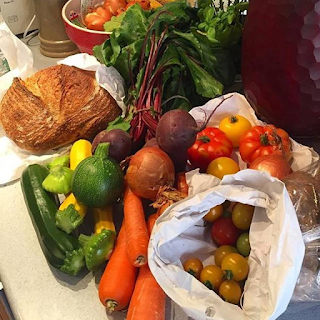Protect the Environment: Be a "Locavore"
Why you should shop local and how to shop sustainably in Nottingham
Written by Astrid Delorme
 |
| Source: https://www.facebook.com/NottinghamFoodAssembly/ |
Biodiversity, or the
variety of the life on our planet, is an intrinsic part of both our economy and
our welfare. However, with rising global temperatures and human populations
adding alarming pressure on our valuable natural resources, one of the main environmental
challenges which modern society faces is assuredly a loss of biodiversity. In
Europe alone, animal species are increasingly coming face-to-face with the very
real risk of extinction as the consequences of climate change provide an
increasing set of risks to vulnerable ecosystems, such as Moorland in the UK.
One of the main drivers
of biodiversity loss is the conversion of natural or semi-natural land for
agricultural purposes, which frequently introduces invasive alien species or
chemicals which prove harmful to that specific environment. This issue is
regularly amplified by the increasing intensification of mono-crops, whereby
farmers will plant the same crops onto the same plots of land year on year.
This rejection of crop diversity not only harms the long-term health and
fertility of soil, but mono-crops such as wheat and soy beans have the tendency
to be heavily dependent on diversity-affecting fertilizers and pesticides. Even
on an economic level, such practices clearly favour larger agricultural
businesses with better access to bulk chemicals over more autonomous
small-scale farmers.
 |
| Source: https://www.facebook.com/NottinghamFoodAssembly/ |
Antithetically, whilst
unsustainable agricultural activities do have detrimental effects on
biodiversity, the opportunity to combat the current loss in biodiversity
equally remains in the hands of the agricultural sector. Small-scale farms,
managed sustainably with plot rotation and a diverse range of crops, are often
the areas which evidence the most biodiversity and the healthiest environment.
However, the
responsibility for promoting the cause of biodiversity doesn’t lie with
agricultural produces alone; it’s conservation depends critically on how we,
the consumer, understand, value and ultimately manage it. We have choice every
day, in fact three times per day, to support the aforementioned sustainable
agriculture which protects and promotes faunal and floral diversity. However,
how do we know if our food is produced sustainably? Indeed, often the groceries
we purchase from supermarkets lack traceability and the method of their
cultivation can be rarely stated.
 |
| Source: https://www.facebook.com/NottinghamFoodAssembly/ |
Farmer’s markets, on
the other hand, provide a direct link between the farmer and the consumer.
Farmer’s markets can promote sustainable agriculture by offering locally and
regionally grown food, supporting small farms staying in business, and in doing
so ensuring sustainable land-use and management. Doing your weekly food shop at
a farmer’s market not only minimises your ecological footprint but also your
carbon footprint. Although this is a great way of supporting small farmers and
getting great produce, there might be things we would want that the farmers
market doesn’t supply or when the market is not open. Organic food shops can
offer a wider range of products and at more convenient opening hours. Labels
such as the Soil Association and Fairtrade ensure that certain standards in
production have been followed with a clear traceability and transparency of the
product source.
Switching to a sustainable,
local and organic diet might seem overwhelming, however there are many options
in Nottingham that can help you to make a change and preserve biodiversity,
some of these are listed here:
-
Food Assembly is a click&collect online
shop where you’ll find a range of products such as wine, organic meat, dairy
products, freshly baked bread, free-range eggs, raw honey and fresh vegetables
from local producers. Order by Tuesday evening (midnight) and pick up your
order from the producers at the Primary (33 Seely Rd, Nottingham
NG7 1NU). You
can access the platform through their app or through their website. https://thefoodassembly.com/en/assemblies/7809.
-
Out of this world is a shop in Beeston (but also do
delivery) that specialises in organic, fair trade, eco friendly, local and
special diets. They offer a wide range of food as well as sustainable household
cleaning products and cosmetics. http://www.ootw.co.uk/
-
Hallam’s is a family run, fishmongers,
wholesale and retail fruit and vegetable merchants in Beeston (but also do
delivery). They sell locally sourced vegetables and, British fruit as well as
milk, eggs and cream. They also try and stock fish from sustainable sources. http://fredhallam.com/
-
Victoria centre market is Nottingham’s largest indoor
market, selling British fish, meat and vegetables. It is run by the Nottingham
city’s council Market team which also organises a number of markets throughout
the year with local and British produce, you can see when they are happening
here: https://www.nottinghamcity.gov.uk/6003
-
Beeston Market is a monthly farmers’ market in
Beeston (every third Saturday of the month) where you will find local produce
such as dairy products, organic meat, jams, artisan bread, free range eggs,
honey, handmade fudge, specialty teas, spices and delicious baked goods. http://www.letsgotobeeston.co.uk/markets-and-fairs-in-beeston/
-
Sneinton Market is open every Monday and Saturday
with fresh fruit and vegetables, and every 1st Saturday of the month
they have a vegan market with vegan food and products. http://www.sneintonmarket.co.uk/


Fab blog!
ReplyDelete